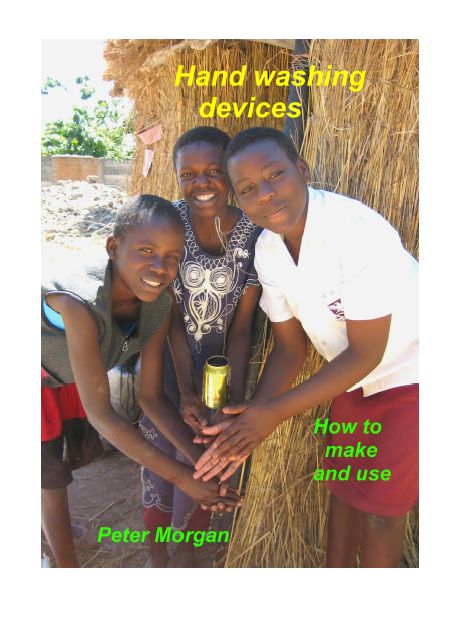
Published in: 2011
Publisher:
Aquamor Pvt Ltd., Zimbabwe
Author:
Morgan, P.
Uploaded by:
SuSanA secretariat
Partner profile:
common upload
15890 Views
386 Downloads
Location of library entry
Content - Summary
For most people living in the developed world, a tap can be found close by to almost every toilet. There is a tap in almost every kitchen and bathroom. The toilet and tap are united to form an essential couple. The implications are enormous. Water flowing from the tap cuts the cycle of disease through the act of hand washing. Sadly that is not the case for most of rural Africa and much of the developing world. Toilets are built in great numbers, but hand washing facilities available nearby may be scarce. Soiled hands carry disease on bacteria. The cycle where bacteria are passed from hand to mouth is a deadly one.
There are few things related to health more important than hand washing. Simple hand washers, like some described in this booklet, are easy to make and cost almost nothing. They can be placed in several places in the garden or home – near a toilet or in the kitchen. They are economical in their use of water – a precious commodity. Inside the home, soap can be placed nearby. In the garden even wood ash, which acts as a mild abrasive and is slightly alkaline can be effectively used if there is no soap. The construction and daily use of These simple devices can make a huge difference to the health and wellbeing of an individual or a family.
The importance of effective hand washing has been taught for decades by staff of the Ministry of Health in Zimbabwe. Amongst several other developments, this led to a change of habit from using a communal bowl for hand washing prior to meal time, to the use of “pour fresh water over the hands” technique. The wash water, caught in a bowl was thrown away to waste. This single change of Hand washing technique had a huge and positive effect on reducing the passage of potentially harmful bacteria from one person to another.
The information in this simple booklet has been accumulated over many years by the writer, from the early days of the Blair Institute, of the Ministry of Health and Child Welfare to later days working with Mvuramanzi Trust and other NGOs. The support of Ephraim Chimbunde and his staff are all gratefully acknowledged. Annie Kanyemba has played a big part in promoting the use of hand washing devices at schools. The school is perhaps the very best place to promote the importance of hand washing and teaching the simplest methods of making Hand washers to the pupils.
Bibliographic information
Morgan, P. (2011). Hand washing devices - How to make and use. Aquamor Pvt Ltd., Zimbabwe
Filter tags
English Guidelines and manuals Practitioners Recommended by SuSanA (other than SuSanA publications) Rural Schools Sub-Saharan Africa














